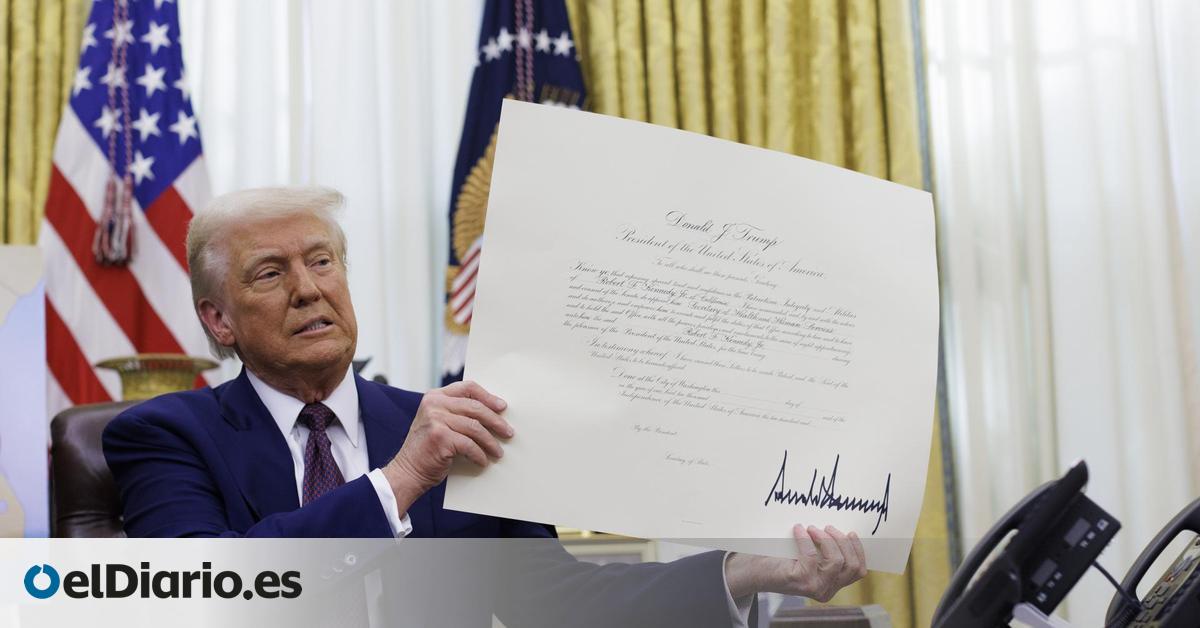
Uncertainty. It is the current situation of European governments in the face of the resurgence of the commercial war by Donald Trump. In the EU they are still waiting for threats to materialize to execute a “proportional response” and political contacts have already begun. At the moment it is difficult to calculate the impact that the tariffs announced by the United States will have in the old continent, to a large extent because those that affect the “reciprocity” are not even designed. What all experts coincide is that Spain will not be one of the most beaten economies, since its exposure to the North American market is less than other community countries, such as Germany, Italy and even Ireland, the three that have a higher commercial surplus with the US . Although it could suffer indirectly due to the fall of exports of its European business partners, especially those of the Germanic country, which is the second destination of Spanish products, behind France.
The balance of the commercial balance of Spain with the US is deficient, that is, it matters more than exports. The deficit is 6,083 million euros compared to the EU set of 190,323 million, according to the latest data available from 2023 to October 2024 of the Chamber of Commerce of Spain. Sales of Spanish products and services to the North American country represent around 4.6% of the total, which represents approximately 1.3% of Spanish GDP. The commercial relationship between the two countries is based more on the importation of energy than on the export of industrial goods. And it is just in this sense that, depending on the response of Europe, the commercial war could more or less affect Spain.
The president of the European Commission, Ursula von der Leyen, said Friday that the “unjustified” taxes of Donald Trump “will not remain unanswered”: “We will take clear and proportionate countermeasures.” The EU could respond with tariffs to American products, as it has done in the past. For example, in the dispute between Airbus and Boeing, the EU imposed tariffs on US goods in response to taxes applied by the American administration to European products.
“We have to be intelligent and lucid about what is in front of us,” said the president of the European Commission after remembering that “commercial wars and punitive tariffs do not work for anyone” because they drive inflation and hit workers, workers, companies and consumers “. The community government, however, aspires to negotiate with Trump before 25% levies to steel and aluminum imports enter into force on March 12. Those are the only ones who are clear for now.
The Chamber of Commerce of Spain estimates that the impact of the reintroduction of 25% tariffs on these products would mean a 10.4% reduction in exports. According to data from 2023, 994 million euros were sold, so the loss of the sector would be about 94 million euros.
The problem is that the community government still does not have the complete photograph of what would be the affectation in economic terms of the latest measures announced by Trump in the form of reciprocal tariffs with the VAT excuse, without a specific date for its application.
The same happens in the case of the Government of Pedro Sánchez. “We cannot make an impact analysis,” sources from the Ministry of Economy point out, which explain that the measures that are planned on the other side of the Atlantic are not yet detailed. What is doing the department that Carlos body directs is to meet with the affected sectors, such as steel and aluminum, which are already clear about their ‘punishment’.
The most punished: from the car to food
The impact of a commercial war between both blocks would be significant in key sectors such as automotive, chemical industry, technology and food. The car will be one of the most, since it is the second sector that most exports to the United States, behind the chemist-pharmaceutical, according to the latest data of the European Statistical Office, Eurostat, corresponding to 2023.
Washington currently applies a 2.5% tariff to imported vehicles, compared to 10% EU tax. A tariff to which Trump now wants to add the VAT, which varies between each EU country and that, in the case of the four -wheeled sector, goes from 17% that applies Luxembourg, 27% that Hungary has, through 21% in Spain or 19% of Germany, according to the EFE agency.
That Spanish industry is not especially concerned because in 2024 no vehicle was sold to that country due to changes in the production cycles and commercial decisions of brands, according to the employers’ employers, ANFAC. Of the 2.2 million cars exported in 2023, only 52,000 units went to the US market.
The chemical and pharmaceutical industry represents more than 19% of community exports to the United States, and 5.39% in the case of Spain. VAT is also different in each EU country, where Hungary applies a rate of 5%, Spain a range that goes from 4 to 21%and Germany 19%.
The White House also pointed to the European seafood sector, explaining that the EU “prohibits” imports from 48 of the 50 US states and that, as a result of this imbalance, in 2023 the United States imported European seafood worth 274 million of dollars, while their exports to the EU only reached 38 million.
In his previous mandate, Trump especially attacked the Spanish agri -food sector as a retaliation for public aid to Airbus. Products such as olive oil and wine experienced strong falls, up to 60% in the US market, and lost competitiveness. Even so, they are still the most exported to the US, along with juices and canned vegetables or vegetables.
The great fear in Brussels is that Trump introduces disparate measures and delves into the division into the EU, so the community government tries to set the possibility of each country making war on their own. “To avoid doubts, trade is an exclusive competence of the European Union. Member States cannot negotiate on their own, ”recalled the spokesman for the European Commission, Olof Gill.
But Spain will have to be attentive to the response of Brussels, since it is a large importer of oil and gas from the US. They reach almost 40% of their imports from that country, if the EU ends up making these products more expensive, the impact on the Spanish energy cost would be significant.
The complexity of reciprocal tariffs
From there, uncertainty is total because with the so -called “reciprocal tariff On the added value (VAT), the products that will be affected or the amount are not known.
“The complexity and magnitude of these reciprocal tariffs is much greater than it was initially understood. A simple version of reciprocal tariffs would have simply consisted of matching the tariffs applied by the US to their imports from third countries. But the presidential administration has decided to adopt a very broad definition of what are considered barriers to the entrance, such as the taxes applied by third countries to its imports from the United States, ”explains Eric Dor, director of Economic Studies of the Economic Studies of the Economic Studies of the French Business School Iseseg.
Estimates had been made with the scenarios of generalized tariffs that Trump threatened from the electoral campaign. Thus, AFI economists calculated, for example, that the imposition of 25% rates to China, Canada and Mexico and 10% to Europe would mean a 1.05% drop in the US GDP this year and 1.59 %, in 2026. In the case of tariffs of 60% to China and 25% to Canada, Mexico and Europe, the constriction would be -1.68% and -2.62%, respectively.
Despite the threats to pay with the same currency, the European Commission wants to take advantage of the rooms to negotiate with the Trump administration. The president of the Community Executive, Ursula von der Leyen, spoke on Tuesday with the American vice president, JD Vance; While the European Commissioner for Commerce, Maros Sefcovic, plans to do it with his US counterpart, is once confirmed.
The message that EU sends to Trump is that the commercial war is not beneficial for anyone, nor for US consumers. “Tariffs are essentially imposed. By imposing tariffs, the United States would be taxing their own citizens, increasing costs for companies and feeding inflation. In addition, tariffs increase economic uncertainty and disturb the efficiency and integration of world markets, ”said the European Commission in a statement.
Source: www.eldiario.es

